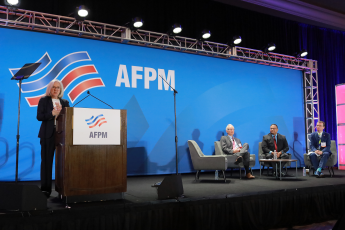Some things don’t change and allow me to say “thank goodness for that” because dealing with changes can be exhausting. So I’m sure that you will find it reassuring to know that you can count on certain elements of the AFPM Annual Meeting program such as FCC Operations; Gasoline Processes; Process Safety; Margin Improvement; Crude Oil Supply; Reliability; and Hydroprocessing to form the core of the technical program each year.
There’s a good reason that these topics can be relied on to appear in the program each year – they are all indispensable to the art of petroleum refining, petrochemicals production, and to making operations safer, more reliable, and more profitable. But even though these topics are hardy perennials, they always offer new technology developments that advance the petroleum refining and petrochemical industries.
Some of the new developments you should look for in the Annual Meeting program include:
• Crude Oil Supply – In addition to presentations on the latest shifts and trends in crude oil supplies, new developments that enable optimization of the crude slate and desalting and distillation operations will be presented.
• FCC Operations – There are always new catalyst developments and this year’s topics include discussions of metals poisoning in general and iron poisoning in particular. The session will also include discussions of afterburn, coke on catalyst, and standpipe issues because sometimes we can develop a better understanding of how the FCC works, even for issues that we had thought were well understood.
• Gasoline Processes – The industry has been seeking alternatives to liquid acid alkylation catalysts for a long time and this year a couple of presenters will describe their latest developments. There will also be a presentation on new process developments that can boost gasoline octane.
• Hydroprocessing – Each year our understanding of hydroprocessing kinetics advances and from that comes catalyst technology developments that improve yields and refinery feed slate flexibility.
• Margin Improvement – Opportunities to improve margins shift around from year to year and this year’s session will present ways to improve the planning process, utilization, and yields, and how to better use the data we already have available to improve operations.
• Process Safety – New developments in process safety include the improvement of procedure compliance, incident analysis, and risk management.
• Reliability – Automation applications are being utilized more widely to address reliability issues from prediction of failures to getting more out of CMMS systems.
Even in this line-up of the “usual suspects” there is always something new at the Annual Meeting technical sessions.
Topics


